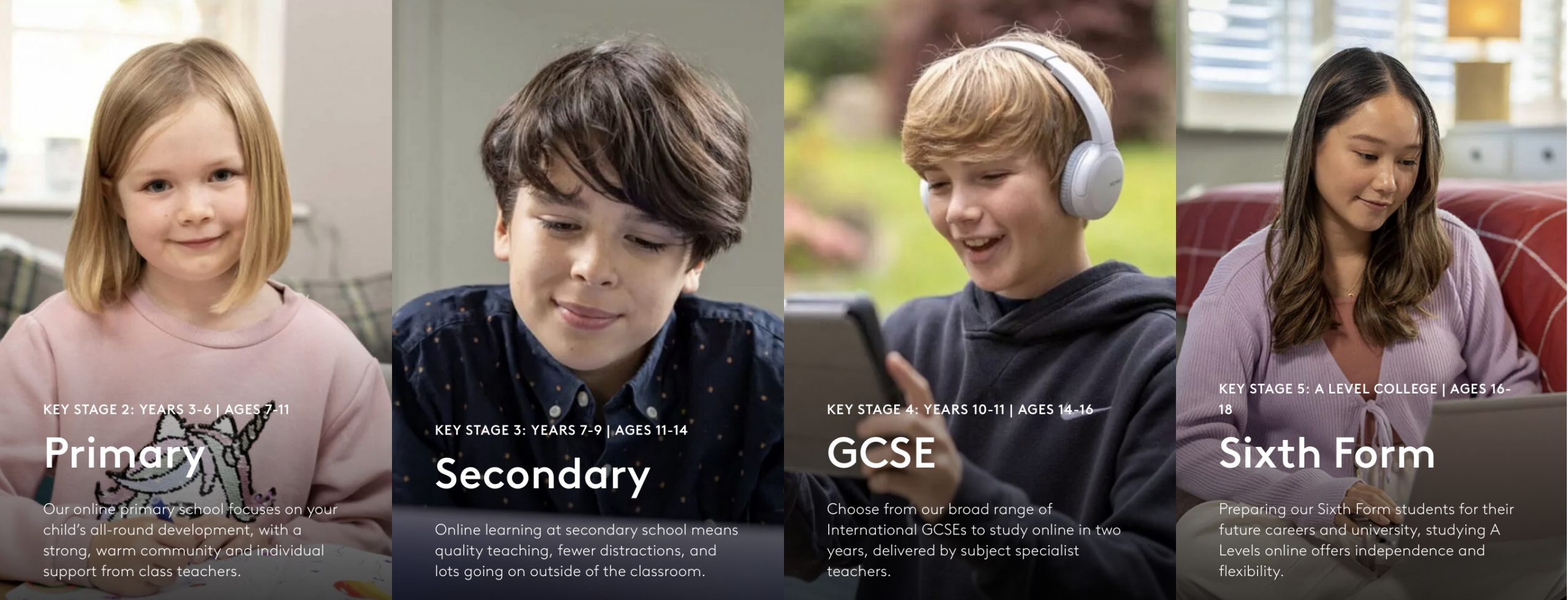After years of intensive education in the UK, UKETS has become a partner with King’s InterHigh, the top professional online education group in the UK. We are providing UK qualify teachers to teach online. Inspired’s British international schools span six continents and 80 countries around the world, with 84 schools and more than 70,000 students.
From September 2023, UKETS will lead overseas children aged 7-18 to join the British online international school and the International Baccalaureate (IB) study together, expecting to provide Taiwanese children with an online British international school with diverse and adaptable subject choices. During the study with us, we can assist students at any time to become exchange students in various international schools in the UK or apply for exchange student programs in British international schools in 84 countries and six continents around the world, as well as study tours during winter and summer vacations, so that children can learn more in their pathway no matter the family’s migration or life plan change.
At each stage of study, UKETS will provide professional education consultation and UK university application, paving the way for students to enter the top universities in the UK and the world.

| British Primary School | British Secondary School (lower grades) | British Secondary School (GCSE) |
British Sixth Form A-Level / IB |
Obey or Debate !
The mother, who grew up in Taiwan, and the father, who grew up with Islamic education, took their three children to travel through multiple education systems due to changes in business plans and finally decided to immigrate to the UK for their children’s education. The mother accompanied the children from nursery to college in the UK for around six years, intensely studied the UK’s educational culture and legal system, and became an education consultant of the British Council and a British immigration lawyer, comprehending the above two words.
Obey and Debate illustrate the fundamental difference in mainstream education and thinking between the East and the West and are also the basis for developing the education system. The core idea of Debate is the foundation of the British education system. This foundation runs through British education, social development, and legal systems.
Why choose British education?
The UK is the home of the English language, which makes it easy for students to immerse themselves in their studies.
The UK offers a world-class education, and students will better understand the English language and British culture.
English language skills are a powerful tool for hundreds of careers, from creating business opportunities in international markets to writing computer programs or teaching.
English is the first language in the world: it is used to maintain and develop professional relationships in politics and business and to develop cultural ties between countries.
Current English Language Facts:
- More than two-thirds of the world’s scientists read in English.
- Three-quarters of the world’s mail is written in English.
- 80% of the world’s electronically stored information is in English.
- English is the most commonly used language on the Internet, with more than half of the home pages of the top 10 million websites in English.
- It is estimated that over one billion people are now learning English.
- British education is about learning more than the language; it is about acquiring powerful tools and life skills of critical thinking.
Britain is the hometown of English, and the teaching style of the British education system actively encourages and cultivates students’ creativity and analytical ability and cultivates students problem-solving skills.
We, UKETS, are a bridge. We provide a British school curriculum for children aged 7-18. We aim to help children develop essential skills in critical stages of life. We also hope to help children worldwide find the joy and enthusiasm of learning through British education.
Educational Styles & Learning Models in the UK
Encourage critical thinking analysis methods, respect the uniqueness of each child, provide opportunities for students to grow into their unique selves, and cultivate students’ intellectual development, helping students develop what they need to succeed in their future life and career intellectual skills and personal character, for example: introducing original ideas into the learning process rather than simply repeating what the instructor told them.
British Teaching Model
Teaching methods are designed to develop independent thinking, interpersonal skills and self-confidence. The British teaching style is to learn in depth through extensive reading.
This includes:
*Critical thinking, questioning and analysis
* Discuss ideas and opinions with teachers and classmates
* Contribute individual ideas during the learning process and in group collaboration
* Develop self-confidence and original thinking
*Learn how to express yourself through essays, presentations and presentations.
Our vision is for each student to graduate as an enthusiastic, thriving young learner. They will actively seek learning opportunities in all aspects of life and acquire the necessary foundational knowledge and skills to meet future learning challenges. Excellent schools recognize that learning is lifelong, and we reject myopic, selfish, and pedagogical approaches that focus only on maximizing short-term academic achievement.
On the contrary, our priority is to guide each student to learn the equipment they need for long-term growth in the future.
Features of British Education
General education before the age of 14, but at the primary school stage, extensive reading will be used to lay a solid foundation for students in reading (generally, children who meet the assessment standards of primary schools must read at least about 300-500 books), critical thinking and communication skills. From the age of 14 in middle school, you have the opportunity to choose 2-3 subjects that you are interested in. After graduating from middle school (16 years old), you can apply for admission if you meet the requirements of high school (Six Form). The grades will be used as the admission basis for future university selection of departments.
The A-Level selection direction can be divided into 5 major direction study groups to choose subjects, and the selection and performance of each department will be related to the opportunity to apply for each department in the future.
Note: Psychology is the most popular degree in 2022 with 84,255 students enrolled, according to figures from the Higher Education Statistics Agency, and this is reflected in trends in A level enrollments, with half of students taking Psychology and Social as one of the three A-level subjects, and then add subjects they are interested in, which shows that half of the young children are trying to understand themselves and others better, in order to better communicate with others and work hard on the road of cooperation.
Educational Achievement
A-Level:
Across the Inspired Group, over 90% of students gain admission to their first choice university (based on 2020 results). A third of graduates attend Russell Group and Ivy League universities. Nearly 60% of A-level students achieved A* and A grades
(In 2020, 27.6% of the students with an A-level average score of A or above in the UK achieved this result)

IB:
King’s InterHigh is part of Inspired, the world’s leading and most innovative education group, delivering proven educational excellence in over 80 quality schools across five continents. Inspired schools have offered the International Baccalaureate® for 44 years and are currently implemented in more than 25 IB schools. In our schools, students regularly achieve top marks of 45, placing them in the top 0.5% of IB Diploma students worldwide.
King’s InterHigh is partnering with Inspired’s IB World School, Monza International School to offer the online IB Diploma programme.


|
Primary School – Year 2-6 British Primary School |
School- Year 7-11 British Secondary School (lower grades) |
GCSE age 16-18 British Secondary School (GCSE) |
A-Level/ IB
British Sixth Form |
Contact >>

